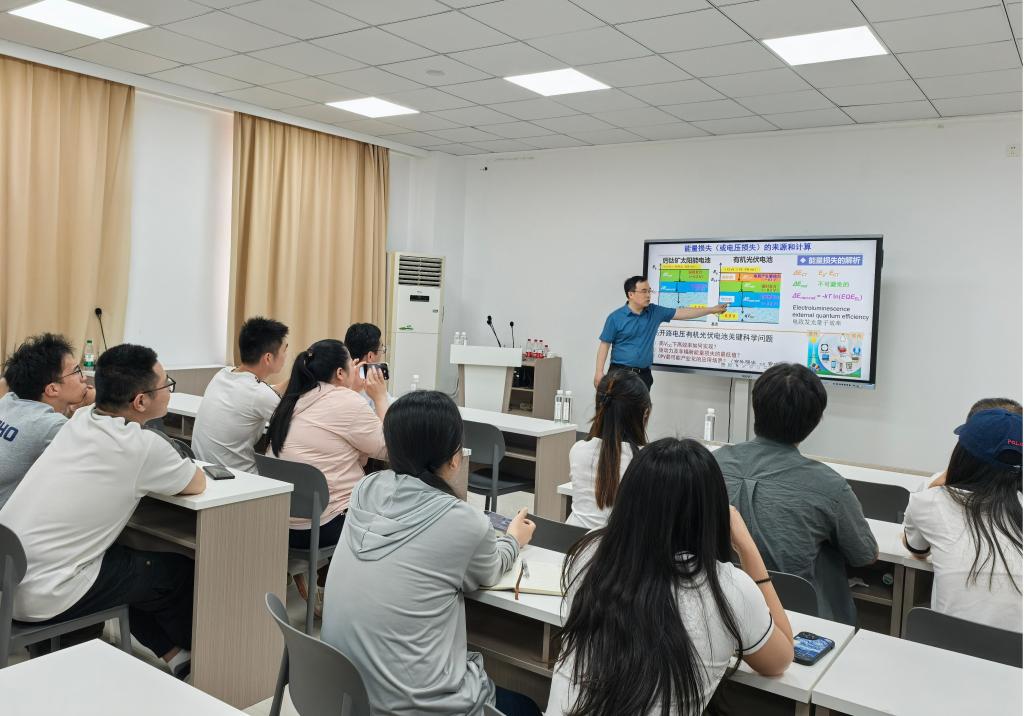Researcher Zhou Erjun from Jiaxing University delivered an academic lecture at the invitation of TU on May 30. The lecture, chaired by Lu Shirong, Dean of the School of Materials Science and Engineering, attracted many key faculty members, graduate students, and undergraduate students.

Researcher Zhou Erjun delivers an academic lecture
Titled “Organic Photovoltaic Materials and Mechanisms with High Open-Circuit Voltage,” Zhou Erjun presented a detailed overview of his research group’s recent achievements in the field which include:
Pioneering Novel Electron-Deficient Units: The group was the first to apply electron-deficient units such as benzotriazole (BTA), quinoxaline (Qx), thienopyrazine (TP), and thiazolidinedione (TD) in the design of wide-bandgap non-fullerene acceptors (NFAs).
Introducing the “Homo-A Strategy”: This innovative strategy involves using the same A-unit to construct both donor and acceptor materials. This approach yielded record-high performance photovoltaic cells with open-circuit voltages of 1.0V, 1.1V, 1.2V, and 1.3V. These wide-bandgap NFAs hold significant value for tandem devices, indoor photovoltaics, and ternary organic photovoltaics.
Developing High-Efficiency Polymer Solar Cells: The group developed a non-halogenated polymer named QQ1, achieving a high-power conversion efficiency of 19.2% in all-polymer solar cells.
Advancing Cathode Interfacial Materials: Novel cathode interfacial materials, NDTI1 and SePDI3, were developed, demonstrating significant efficiency improvements compared to classical materials.
Investigating Device Mechanisms: In-depth research was conducted on the critical academic issue of exciton dissociation driving force. This work provides new opportunities for understanding and overcoming the trade-off between open-circuit voltage and short-circuit current.
Creating Hole Transport Materials: Novel hole transport polymer materials were developed and successfully applied in high-efficiency CsPdI2Br single-junction and tandem solar cells.
Expert Profile:
Zhou Erjun is a Researcher at Jiaxing University. He received his Bachelor’s degree from the University of Science and Technology Beijing in 2001, and his Ph.D. from the Institute of Chemistry, Chinese Academy of Sciences (ICCAS) in 2007, under the supervision of Academician Yongfang Li. From 2007 to 2014, he conducted postdoctoral research at the University of Tokyo and RIKEN (The Institute of Physical and Chemical Research), Japan. His research centers on organic and perovskite photovoltaic cells. He has made significant contributions in areas including organic photovoltaic materials/devices and mechanisms with high open-circuit voltage, the design of high-efficiency polymer donor materials, and high-performance all-inorganic perovskite solar cells. He has led multiple research projects, including four grants from the National Natural Science Foundation of China (NSFC) General Program, a Key Research Program of the Chinese Academy of Sciences Frontier Sciences, and a grant from the Beijing Natural Science Foundation. He has also participated in major national projects such as the National Key R&D Program of China (Nanotechnology) and the Strategic Priority Research Program of the Chinese Academy of Sciences. He has authored or co-authored over 200 SCI-indexed papers, accumulating more than 12,000 citations and achieving an h-index of 62 (Google Scholar data). Among these, he has published over 160 papers as corresponding author or first author in prestigious journals including Nature Communications (2), Journal of the American Chemical Society (JACS), Angewandte Chemie International Edition (5), Advanced Materials (6), and Energy & Environmental Science (4).